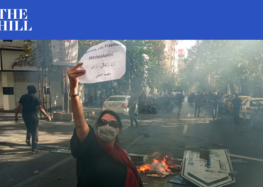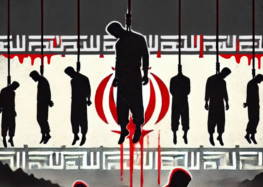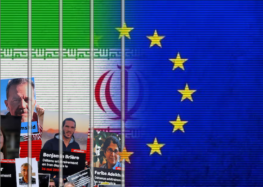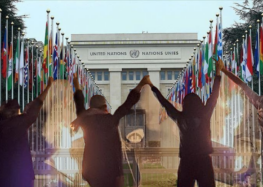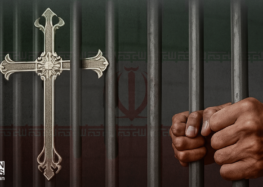Leading Human Rights Lawyer Detained on Spurious Charges
Case Highlights Attack on the Legal Community
 (24 April 2011) The Iranian Judiciary and Intelligence Ministry should immediately release prominent human rights lawyer Mohammad Seifzadeh, the International Campaign for Human Rights in Iran said today. The Campaign expressed serious concern regarding Seifzadeh’s baseless detention and reported ill health. He has been denied access to his attorney, and other internationally guaranteed due process rights.
(24 April 2011) The Iranian Judiciary and Intelligence Ministry should immediately release prominent human rights lawyer Mohammad Seifzadeh, the International Campaign for Human Rights in Iran said today. The Campaign expressed serious concern regarding Seifzadeh’s baseless detention and reported ill health. He has been denied access to his attorney, and other internationally guaranteed due process rights.
“The arrest of Mohammad Seifzazeh is yet another illegal assault on Iran’s human rights defense community,” said Hadi Ghaemi, spokesperson for the Campaign.
“Seifzadeh is being prosecuted because of his adherence to professional ethical standards, and his praiseworthy defense of those denied their human rights,” he said.
Mohammad Seifzadeh is an internationally recognized lawyer and a founding member of Center for Human Rights Defenders. A lower court sentenced him to nine years in prison and a 10 year ban on legal practice in October 2010. His case is currently under review by Appeals Court Branch 54. His charges in the case are “collusion and assembly with the intent to disrupt internal security,” “propagation activities against the regime,” and “establishing the Center for Human Rights Defenders.”
In an interview with the Campaign, Marzieh Nikara, Seifzadeh’ lawyer, said that he has been in detention inside the Intelligence Office of the northwestern city of Orumiyeh for the past two weeks on charges of attempting to leave the country illegally. Nikara told the Campaign that Seifzadeh had gone to Orumiyeh for a research project, adding that she did not know how and when her client had been arrested.
“Unfortunately, when I went to the Orumiyeh Intelligence Office with Mr. Seifzadeh’s son on 23 April, they did not allow me to visit with my client. I don’t even know on what day and where exactly he was detained, and I wasn’t allowed to read his file, either. Only his son was allowed to see him for about two minutes. He said his father has lost a lot of weight, he was limping, and that it was quite clear he was under pressure,” said Marzieh Nikara.
“We had no news of Mr. Seifzadeh for two weeks. It appears that he went to Orumiyeh for a research project on 6 April. He contacted his home on 21 April, and informed [his family] that he is inside the Orumiyeh Intelligence Office. But what the investigative judge in the case said was that Mr. Seifzadeh was detained on 11 April. The investigative judge said that when his case arrived in the branch, he ordered [Seifzadeh’s] interrogator to allow him to contact his family that same day, but this did not happen until 21 April,” said Nikara about how they found Mohammad Seifzadeh in Orumiyeh.
Many Iranian human rights lawyers, including Nasrin Sotoudeh and Mohammad Oliaifard, have been in prison for months. Other prominent lawyers such as Mohammad Ali Dadkhh, Abdolfattah Soltani, and Khalil Bahramian have also faced prosecution.
Since the disputed election of June 2009, Seifzadeh has been forbidden to take political cases. A number of former prisoners of conscience have told the Campaign that judiciary officials denied their requests that he serve as their lawyer. The Iranian Judiciary and intelligence agencies systematically and illegally have prevented Seifzadeh and other prominent lawyers from practicing law. Weeks prior to his arrest, Seifzadeh told the Campaign that he was interrogated for hours by intelligence fierce who asked him to stop accepting political clients.
As one of Iran’s most prominent lawyers, he courageously defended a large number of political prisoners in court. He has a reputation of being persistent and against compromising the integrity of his clients in political deals. Over the past years he has exposed a wide range of human rights violations committed by the Judiciary and the Intelligence Ministry.
According to his attorney, Marzeieh Nikara, “Seifzadeh’s charge is ‘acting against national security through illegal exit,’ and he is currently at the Intelligence Office on temporary detention orders. So far, no arguments in support of Mr. Seifzadeh’s intent to exit the country have been presented. If the arguments are presented, I will react accordingly. Otherwise, I will seek to convert his temporary detention orders to release on bail.”
Asked how Seifzadeh’s presence in Orumiyeh could have been construed as exiting the country, she said: “This is exactly what our argument is, but the case’s investigative judge argues that Orumiyeh is a border city that has a border with Turkey. His whole argument is why didn’t Mr. Seifzadeh go to central cities for his research projects, and instead went to Orumiyeh.”
“When Mr. Seifzadeh’s activities as a lawyer became limited, he did more research projects. In his interrogations, Mr. Seifzadeh stated that he did research activities in Orumiyeh. I don’t know what the research projects were about, as I have not seen my client yet, but what I could surmise from in-between the words of the case’s investigative judge, was that Mr. Seifzadeh said during his interrogations that he has interviewed about 20-30 Afghani nationals for his research project,” she added.
“The important thing is that my client went to Orumiyeh for a research project and Orumiyeh is a part of Iran, and there are no limitations for any Iranian citizen to enter any city inside Iran. It is questionable how such a treatment has come about,” said Marzieh Nikara, objecting to the charges against her client.
“His son talked to him in an atmosphere dominated by security agents. His interrogator was present in the room and they were unable to talk freely, and only greeted each other. But when his son came out, he told me that his father’s beard had grown, he had lost a lot of weight, and when he got up to embrace his son, he had a limp in one of his legs. I asked him whether he could see any signs of physical abuse in his face or hands, and he said that there were no marks on his face or hands, but there was a limp in one of his legs,” said Seifzadeh’s lawyer about his sbrief visit with his son, lasting no more than two minutes.
Nikara stated that Seifzadeh’s wife thought that her husband’s sentence must have been upheld, and that he must have been transferred to prison, as an explanation for his disappearance. “Now what is important is that my client is ill, he has a heart condition, and if this situation should continue, his life could be in danger,” she concluded.
The International Campaign for Human Rights in Iran calls for the immediate release of Mohammad Seifzadeh, and for the Office of the High Commission for Human Rights to intervene to protect his rights and physical safety.

